Zoe Kazan: ‘There’s so much sexual harassment on set' | Film
Zoe Kazan has been in a lot of movies but, as she tells me on the short walk from a photo studio in Manhattan to an Indian restaurant for lunch, she has been troubled by the paparazzi only once. The actor is in pale dungaree shorts and an embroidered denim jacket, and at 33 is slight and earnest; she could, if she wanted to, still just about carry off bunches. To her bemusement, she is sometimes referred to as “Hollywood royaltyâ€, on account of her famous grandfather, the late Hollywood director Elia Kazan, and also nudges into the demographic of celebrity couple: Paul Dano, Kazan’s boyfriend of 10 years, is the more recognisable of the pair, but neither has been of any interest to the tabloids, Kazan says, until last year, when Dano appeared as Pierre in the BBC’s War And Peace. Suddenly, British paps materialised outside their Brooklyn apartment.
That relative obscurity may be about to expire. Kazan has had many small, pivotal roles in big productions, among them Sam Mendes’ Revolutionary Road and the HBO adaptation of Olive Kitteridge; but her new film The Big Sick, a charming and smart romantic comedy produced by Judd Apatow and co-starring Kumail Nanjiani, has won universal praise in the US. Kazan plays Emily, Nanjiani’s girlfriend, who shortly after they start dating and split up, falls suddenly ill, ending up in a medically induced coma.
It’s a strange premise for a movie, no less so for being based on a true story: Nanjiani, a standup comedian, and the real Emily, then a psychotherapist in training, eventually wound up together and co-wrote the film. It is also a finely wrought study in dating across a cultural divide (there’s a great joke about the saintliness of Malala Yousafzai that feels as if it has been a long time coming), with Nanjiani’s Pakistani parents vehemently resisting anything but an arranged marriage for their son. Kazan’s performance, meanwhile, perfectly nails that indeterminate age when the boundary between self-protection and boldness is still being drawn.
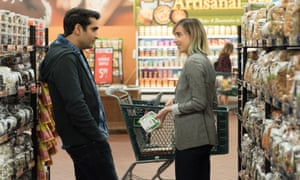
Off-screen, Kazan could be said to be in a similar phase. She is good friends with Lena Dunham and one senses a similar political engagement and desire to do what’s right, even at some personal cost. She is open about her teenage eating disorder, the difficulties of sustaining a relationship with another actor and the double standards of the industry â€" something few female actors are willing to get into, lest it mark them out as complainers. Kazan’s transparency is, perhaps, partly down to the fact that she is a writer, too: in 2012, she wrote the movie Ruby Sparks, which Dano co-starred in; she has also written several plays, the most recent of which is After The Blast, set in the wake of an environmental disaster, to be staged at Lincoln Center in New York later this year.
Kazan resisted writing for a long time. Both her parents are screenwriters: her mother, Robin Swicord, wrote The Curious Case Of Benjamin Button and The Jane Austen Book Club, while her father, Nicholas Kazan, wrote a string of 80s hits; together, they co-wrote Matilda. As a child, this didn’t look to Kazan like much of a life. She grew up in Los Angeles, near Venice Beach, which, she explains, was not the ritzy hangout it is now, but scruffier and more bohemian. When she is homesick, it’s not the LA of the movies she longs for, but Joan Didion’s version. “Reading her feels closest to my actual experience,†she says. “Of all the California myths, that’s the one I reach for.†It is, she admits, somewhat bogus of her to identify with Didion this way. “My parents are both East Coast transplants to LA, but I grew up feeling I was descended from the pioneers. It wasn’t until I was an adult that I realised that had been an erroneous assumption. But in my subconscious mind, I thought, ‘I’m with those guys, I’m western.’ I think it’s been very good for my sanity not to be based there as an actor, but I miss California all the time. Paul is a native New Yorker and†â€" she smiles â€" “it’s always a discussion.â€
She did not grow up in a celebrity household. Her grandfather had been very prominent in the 1950s, directing a string of huge movies including A Streetcar Named Desire and On The Waterfront; but by the time Zoe came along, the industry’s interest had moved on. It took a while for her parents to become successful. When she was very young, both worked at home because they couldn’t afford to rent offices. “I remember being two maybe, and hearing my mum’s typewriter in the other room and sticking my hands under the door and screaming, ‘Mum! Mum!’ I was so angry she wouldn’t come out. I got used to it, quickly.â€
As Kazan got older, her parents moved their offices out of the house. Still, she says, “It looked really lonely. Sometimes at the dinner table it was like there was a fog around them, when they were in the real process of being in their draft. They never had to see anyone. I mean, they had friends, but they were never in collaboration, they were in their own world. And I was a very emotional kid, the most extrovert person in my family, and I was like, ‘Oh, I’ve got to do something else.’â€
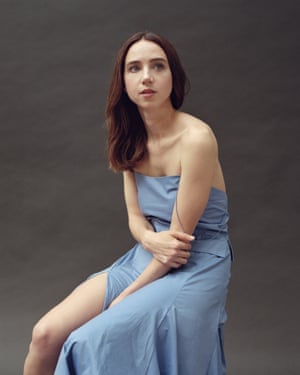
Later, she would look back at her parents’ example and be grateful. They pulled off a tricky thing, she says; communicating to their two daughters â€" Kazan has a younger sister, Maya, an actor and director â€" that they were the most important things in the world, but that work was important and meaningful, too. “They made a great effort to strike a balance between time for us and time for their work, and I really appreciate, now, the example that my mum in particular set.â€
The space occupied by, and denied to, women is one Kazan has focused on in her own work. Ruby Sparks is about a fictional woman come to life, a female-led version of all those male fantasy movies such as Weird Science; Kazan exposes the limitations of that fantasy (Dano plays a novelist whose heroine, played by Kazan, steps full-blooded into his life, whereupon he discovers that to exert total control over another human is less of a gift than a nightmare).
Living with Dano for 10 years has made her keenly aware of the experience gap between male and female actors. Partly, she says, it’s a straightforward question of gender stereotyping: “We talk a lot right now about ‘toxic masculinity’, but it’s a real thing. Paul is a very emotional person. I mean, he’s also a boy’s boy, really into sports, and people can be surprised by how bro-y he is. But he’s very sensitive and the art he responds to is very emotional. And yet, nine times out of 10 [in a role], I have to cry, and he rarely has to cry. I think once in an audition I had to have a gun and be tough, and his auditions have involved guns or a kind of toughness so many times. I think there’s a difference in the range of roles he is offered, compared with the range I have access to.â€
There are other, more overt differences. “There’s so much sexual harassment on set. And there’s no HR department, right? We don’t have a redress. We have our union, but no one ever resorts to that, because you don’t want to get a reputation for being difficult. I’ve told Paul about stuff that has happened on set and it’s almost as if he can’t take it in. It’s too upsetting. And he’s never had to deal with that once.â€
Sometimes, Kazan says, the harassment is so subtle, it’s hard to articulate. “I have a lot of girlfriends who are amazing actors, and many times we’ve talked about having to go into a room and give ‘blowjob eyes’. You know, be flirty with a director or a producer. It’s the sense that your sexuality is somehow baked into this situation. Or there’ll be auditions where they’ll say, ‘Wear something body-conscious’ and then you’re aware that they’re checking out your body. You leave the situation feeling not good about what just happened, but you don’t really have the language for why. You feel like, if you said something, it would reflect badly on you.†This was not Kazan’s experience on The Big Sick, she adds, which “was a very clean job for me. Everyone was super respectful.â€
Was she ever directly propositioned on other sets?
“No. I mean. Hmmm.†There is a long pause. “Like, I had a producer ask me on set once if I spat or swallowed. At work. He’d say, ‘Oh, it’s a joke, ha ha.’ But he was also paying my cheque and then watching me from the monitor as I made out with another actor â€" so when he tells me I look good, it feels different. I was in my mid-20s at the time. I was not powerful, I did not feel I could say anything.†There is another long pause. “That has got better as I’ve got older, partially, I think, because I’m better at knowing how to shut that down. But it makes you feel guilty, and bad, as if it’s somehow your fault â€" that you’re somehow giving that person the signal that it’s OK to treat you that way. And none of that is stuff that Paul has to deal with.â€
***
In November last year, Kazan wrote an essay for the New York Times about the eating disorder she suffered in her late teens. She was a theatre and English student at Yale; not, she points out, the famous Yale postgrad theatre course that Meryl Streep took, but the undergraduate programme that offers no practical acting experience. “They sneak in acting classes, but it’s all The Theatre Of Weimar Germany, and Dramaturgy: A Deep Dive Into Ibsen. God forbid you actually have a skill at the end of it.â€
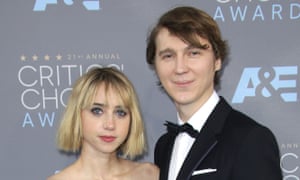
Her parents hadn’t been thrilled when she announced a desire to become an actor, and after reading her article, I assumed it was because of the eating disorder. But it wasn’t that, she says. “No, because I wasn’t sick then.†They were dismayed, she says, simply because, “having spent enough time around actors, they knew that actors... I don’t think it’s a very happy-making profession. They just felt it was not a recipe for happiness. And they thought I was a good writer.â€
By the time Kazan was 23 and met Dano, when they both appeared in a 2007 off-Broadway play, she was more or less recovered. But in her late teens and early 20s, it all felt very perilous. “I’m prone to depression, and other forms of self-destructive behaviour that have come out of my depression, and my eating disorder very much did. I was always slim. It didn’t start out with me thinking, ‘Maybe I’ll lose five pounds so I can be more attractive.’ I think, for most people, it doesn’t start that way.â€
Having been through it and come out the other side, Kazan says she has developed a certain immunity to the pressures of being a woman on-screen. “I do feel like I have the superpower of not caring about my body as an actor. The place I was in at 18 was so dark, I never want to go back there. I’ve touched the fire. I’m not interested in it. I don’t weigh myself, we don’t have scales in the house. When I first signed with my manager, I said, ‘I’m never going to lose weight for a role, so you just have to take that off the table.’†Now, when she looks back at her earliest roles, she can see the last vestige of the illness on her body. “In Revolutionary Road, I was still puffy from my eating disorder, because your metabolism slows down a lot. That was the impetus for me to talk about it publicly â€" I saw myself being tagged on Instagram as a ‘thinspiration’ and that made me really sad.â€
How did she leave her eating disorder behind? “I got to the point where I didn’t want to be sick any more,†she says, simply. “And it took me much longer to be well, because of what anorexia does to your brain chemistry. It was very hard for me to come back to a place of feeling normal about food, and about my body. And then, when I came to the other side of it, it felt like something was gone. An exorcism. I still experience the same chemical swings, and moods, and pain, but I’m much better at dealing with it than I was at 18.â€
The stability she found with Dano is something she still finds surprising. “I think I just got lucky. And then we just kept at it. No relationship is a straight line, and there were definitely times where we were like: we’re not going to make it through this summer.â€
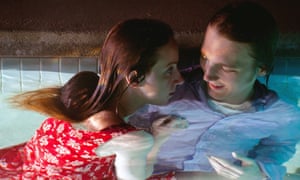
Is it ever helpful that they spend lots of time apart? “I don’t think it’s that good. I mean, it’s good in that you don’t take each other for granted, and I suppose certain things stay new. But it makes it very hard to have a sense of continuity. I think schedules are good. They’re good for two-year-olds, and they’re good for adults.†The relationship works in part, she says, because “the nice thing about there being a gender difference is that there’s no competition. I think if I was with a woman and she was also an actor, it would be much harder for me not to feel that our careers were in juxtaposition.â€
Last year, Kazan was cast at the last minute in a pilot directed by Lena Dunham, which ended up not being made. It was called Max and was set in a 1960s feminist magazine clearly modelled on Ms, and while Kazan was sad not to work with her friend, she wasn’t too disappointed. She takes inspiration from other women she’s worked with. In The Big Sick, her character’s mother is played by Holly Hunter. “She’s very kind,†she says. “Her boundaries are not low, but she doesn’t carry a lot of ego or personal success history with her. She’s very easy to be and to act with â€" generous, game.â€
Where did she feel Hunter’s boundaries lay? “I just mean she doesn’t strike me as an intimacy junkie, in a way that a lot of actors are. I am, and I like to get right in there. But I think what age and experience has taught her is not to lean forward into every person she meets. She’s very curious, and really accessible in some ways, but there’s something private. It’s nice.â€
Kazan’s grandfather’s fame is where her own boundary lies. Since 1952, when Elia Kazan gave the names of eight actors to the House Un-American Activities Committee during the McCarthy communist witch-hunt, his reputation has been tinged with notoriety; in 1999, when the then 89-year-old received a lifetime achievement award at the Oscars, it led to protests outside the theatre in support of and against him.
This is a tricky one for Kazan. First, she says, her grandfather’s celebrity is not a big deal in her life. “I think a famous parent is really different from a famous grandparent. My parents are very successful, but no one knows who they are and they live a completely grounded, homey life. I’m friends with the Gummer girls, whose mum is Meryl Streep, and that feels from the outside like a different kind of burden. I’ve never had to think about paparazzi. I don’t want to erase the deep privilege of being white and upper middle class and having parents who had time to read to me; a whole host of things that “normal†is not a useful word for. But, like, grounded and not Hollywood.â€
Then again, she says, “I love it when older people come up and say, ‘I met your grandfather.’â€
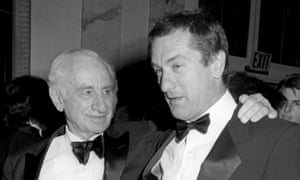
Are the comments about him always positive? Kazan thinks for a moment. “That stuff is complicated. Because I really loved my grandfather, and because I don’t have a huge need to tear him down in my mind, I try not to spend too much time on that. There’s a podcast, You Must Remember This, that did a whole season on the blacklist, and I chose not to listen to it, because I felt like my grandfather is a precious person to me, and we only get so many grandparents. I know all about the history, and I’ve read about it. But hearing someone talking about it feels different from reading about it, and hearing them pass judgment.â€
Kazan has become very good at knowing how to protect herself. Two years ago, she experienced burn-out after a particularly intense period of work and wondered if she should get out of acting altogether. She rebooted by reading, and being with friends, so that, “When I put something out again, it’s from a place of fullness, rather than barrenness.†These days, when she gets a day off, she tries to structure it so that she’s not slumped at home doing nothing.
“The older I get, the more I feel I have to value my time, and not in a for-work way,†she says. “Making a concerted effort to call a friend, go for a walk, spot my days when I’m unemployed with things that are nice. Rather than three weeks of watching TV.†It is the beginning of what Kazan thinks of as the wisdom of age; to think more, worry less, to “enjoy the experience of my lifeâ€.
• The Big Sick is released on 28 July.
Styling: Danielle Nachmani for The Wall Group. Hair: Christopher Naselli. Makeup: Gita Bass, both for Starworks Artists. Shirt by La Ligne; vintage jeans by Levi’s; blue top and skirt by Khaite.

0 Response to "Zoe Kazan: ‘There’s so much sexual harassment on set' | Film"
Posting Komentar